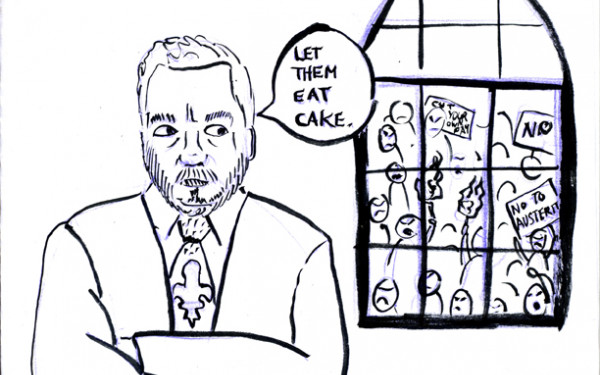A Problem With Austerity
Tuition Is Just the Beginning When It Comes to Belt-Tightening
The voices in favour of austerity—higher tuition fees, reduced government spending, wage freezes and layoffs in the public sector—have failed to articulate where they see this finally ending.
The implication seems to be that after a few years of “belt-tightening,” things will somehow get better. Economic growth will pick up, budgets will be balanced and everyone will be happy.
Whether it’s higher tuition fees for students in Quebec, frozen wages for teachers in Ontario or draconian reforms to Employment Insurance for seasonal workers across Canada, the message from the mainstream punditry is clear: suck it up, pay your “fair share” and things will eventually get better.
But what if things don’t improve? In a world where national economies are more intertwined than ever, crises abroad can easily reverberate back here.
If we enter another recession—and the slew of gloomy economic data coming out suggests this a possibility—current federal and provincial targets for balanced budgets will get thrown out the window.
Federal Finance Minister Jim Flaherty promises a return to budgetary surpluses by 2015-16, while his provincial counterpart, Nicolas Marceau, forecasts Quebec will emerge out of deficits as early as 2013-14.
As the recent surprise budgetary shortfall in Alberta—Canada’s richest province—shows, forecasts are only best guesses. And as we’ve seen, they often prove to be too rosy and optimistic.
Odds are, federal and provincial budgets will not be balanced by the dates promised by their respective finance ministers. If so, will the public be called upon to make even more sacrifices? Conceivably, yes.
Slashing deficits through reduced social spending and higher taxes and fees (tuition, for instance) would, on the face of it, seem a reasonable approach for any government looking to balance its books. Alas, as we have painfully witnessed in the still-unresolved European saga, this has proved much harder to implement in practice.
A vicious cycle soon ensues. The effects of government cutbacks (public sector layoffs and wage freezes, reduced social assistance) hinder any economic recovery, preventing anticipated increases in tax revenue, thus leaving budgets still in the red.
It is a conundrum faced by most governments in advanced capitalist nations. Confronted with aging populations, tepid economic growth, and a less even distribution of wealth, the challenge of how to fund and maintain the welfare state has come to the fore.
While students are easy targets when it comes to passing on the costs of austerity, how governments address other looming challenges might prove even more problematic.
Take the ticking demographic time bomb, for instance. As baby boomers age and retire, a significant chunk of the population will move from being taxpaying workers to recipients of social insurance.
The numbers paint a bleak picture. Thirty years ago, there were six workers for every retiree in Canada. Today there are fewer than four, and two decades from now that figure is projected to dip below two.
“Take the ticking demographic time bomb, for instance. As baby boomers age and retire, a significant chunk of the population will move from being taxpaying workers to recipients of social insurance.”
Needless to say, an unprecedented strain will be placed on both public and private pension funds. This can already be seen in the increase in the minimum retirement age and in higher contribution rates.
In other words, we shouldn’t expect anything near the same retirement perks as our parents. A greying population will also place greater demand on an already financially strained healthcare system. It will be us (you know, that spoiled, entitled generation) that will ultimately be left to foot the bill.
But my point is not to direct anger toward a generation that reaped the benefits of a social safety net won largely through bitter struggles of collective bargaining and organized labour. I am only pointing out the contradictions of a political and economic system that is starting to show some cracks.
The social contract between capital and labour that helped create a strong middle class throughout Western Europe and North America is slowly unravelling.
A more profound transformation is in order, as the current power structures of global capitalism need to be questioned.
Is it acceptable, for instance, that governments of all stripes be held at the mercy of bond-rating agencies and financial markets—who, incidentally, plunged the global economy into this mess five years ago?
Should indefinite economic growth—largely incompatible on a planet with finite resources—be the underlying assumption driving the decisions of policy makers?
There are no easy answers to these questions, but kicking the can down the road promises only a bigger mess to clean up later. These are questions that need to be tackled now.
Adam Aberra is in his fourth and final year of a Bachelor of Commerce in finance.

_900_598_90.jpg)


06_600_375_90_s_c1.jpg)

(JaydeGraeme)-01_600_375_s_c1.png)
